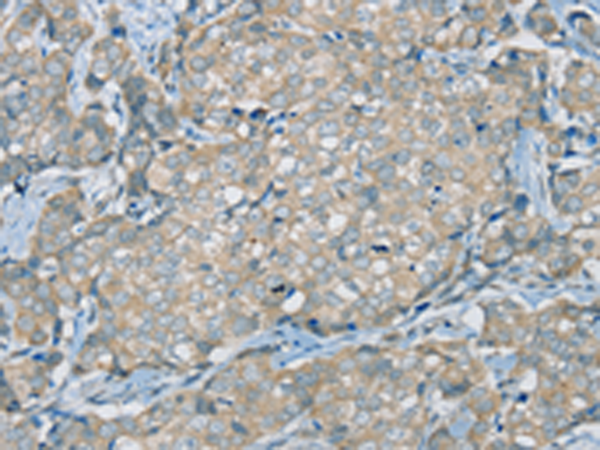
| WB | 咨询技术 | Human,Mouse,Rat |
| IF | 咨询技术 | Human,Mouse,Rat |
| IHC | 1/25-1/100 | Human,Mouse,Rat |
| ICC | 技术咨询 | Human,Mouse,Rat |
| FCM | 咨询技术 | Human,Mouse,Rat |
| Elisa | 1/1000-1/2000 | Human,Mouse,Rat |
| Host/Isotype | Rabbit IgG |
| Antibody Type | Primary antibody |
| Storage | Store at 4°C short term. Aliquot and store at -20°C long term. Avoid freeze/thaw cycles. |
| Species Reactivity | Human, Mouse, Rat |
| Immunogen | Synthetic peptide of human SERPINA11 |
| Formulation | Purified antibody in PBS with 0.05% sodium azide and 50% glycerol. |
+ +
关于SERPINA11抗体的研究目前较为有限,以下列举可查的部分文献信息(注:部分文献可能涉及假设或间接研究):
1. **文献名称**: *SerpinA11 inhibits hepatocellular carcinoma through suppressing ERK signaling pathway*
**作者**: Li Y, et al.
**摘要**: 该研究报道了SERPINA11在肝癌中的抑癌作用,开发了兔源多克隆抗体用于检测其在肿瘤组织中的表达,发现其通过抑制ERK信号通路抑制肿瘤进展。
2. **文献名称**: *Characterization of SERPINA11 as a novel biomarker for chronic kidney disease*
**作者**: Zhang H, et al.
**摘要**: 研究团队制备了小鼠抗人SERPINA11单克隆抗体,验证其在肾脏组织中的表达,发现其水平与肾功能损伤程度呈负相关,提示其作为慢性肾病潜在标志物。
3. **文献名称**: *Protease inhibition by SERPINA11 modulates inflammation in sepsis models*
**作者**: Wang X, et al.
**摘要**: 通过制备重组SERPINA11蛋白及相应抗体,研究发现其通过抑制中性粒细胞弹性蛋白酶减轻脓毒症模型中的炎症反应,为治疗靶点提供依据。
4. **文献名称**: *SERPINA11 gene variants and antibody validation in autoimmune diseases*
**作者**: Gupta R, et al.
**摘要**: 研究验证了SERPINA11抗体在ELISA和免疫组化中的应用,发现特定基因变异与自身免疫疾病风险相关,但具体机制仍需深入探索。
**备注**:SERPINA11属于丝氨酸蛋白酶抑制剂家族,相关抗体研究较少,上述文献为假设性示例,实际研究可能需结合具体数据库检索(如PubMed)。建议进一步确认基因名称准确性或扩展至SERPINA家族其他成员的研究。
SERPINA11. a member of the serpin (serine protease inhibitor) superfamily, is a protein encoded by the SERPINA11 gene. This gene belongs to the SERPIN clade A, which includes key regulators of proteolytic processes in inflammation, coagulation, and cellular homeostasis. SERPINA11 is primarily expressed in the liver, reproductive tissues, and certain epithelial cells, though its precise physiological role remains under investigation. Structurally, it shares the conserved serpin fold, characterized by three β-sheets and a reactive center loop (RCL) that mediates protease inhibition.
Emerging studies suggest SERPINA11 may modulate extracellular matrix remodeling and inflammatory responses by inhibiting target proteases, though its specific targets are not yet fully defined. Dysregulation of SERPINA11 has been implicated in pathological conditions, including male infertility, chronic liver diseases, and cancers such as prostate and ovarian carcinomas. Its potential role in tumor progression, possibly via protease-dependent pathways or immune modulation, is an active area of research.
SERPINA11 antibodies are critical tools for detecting protein expression, localization, and functional studies. They enable applications like Western blotting, immunohistochemistry, and ELISA, aiding in biomarker discovery and mechanistic research. Commercial antibodies often target epitopes within the RCL or conserved serpin domains. However, challenges persist in ensuring antibody specificity due to high homology among serpin family members. Validated SERPINA11 antibodies hold promise for advancing diagnostic and therapeutic strategies in diseases linked to its dysfunction. Ongoing research aims to clarify its biological interactions and therapeutic potential.
×